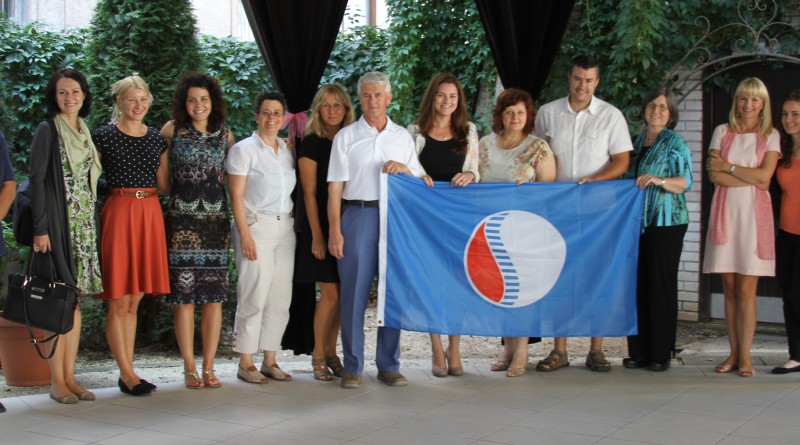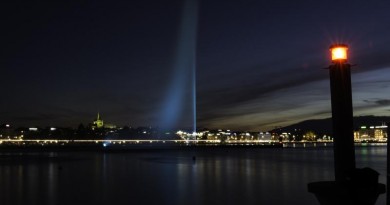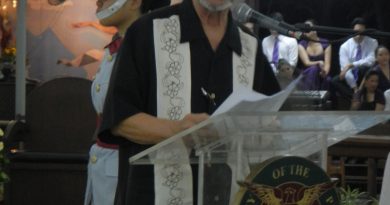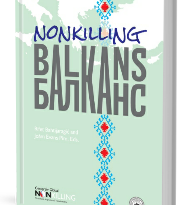Sarajevo Declaration for a Nonkilling Balkans
The participants of the Nonkilling Balkans Forum have just issued the final “Sarajevo Declaration for a Nonkilling Balkans” that was drafted upon the discussions of the gathering that was convened in Sarajevo, Bosnia and Herzegovina, on August 28-29, 2014. The initial signatories invite all to join the efforts of the Nonkilling Balkans Forum by signing the Declaration and becoming involved in its implementation.
Download «Sarajevo Declaration for Nonkilling Balkans (English version)» [1.62 MB] Download «Sarajevo Declaration for Nonkilling Balkans (Central South Slavic version)» [1.57 MB]Sarajevo Declaration for a Nonkilling Balkans
- Gathered in the convergence of commemorations of WWI and WWII, two of Europe’s most dreadful wars, we abhor the vision of the Balkans as a place of bloodshed. On the contrary, we seek to reinstate and celebrate our Common Nonkilling History and Balkan contributions to a peaceful killing-free world: from Bogomil pacifist spirituality to early peace research; from centuries of peaceful multicultural coexistence to the first calls for unconditional nuclear disarmament; from daring antiwar activism in the midst of battle to applied nonviolent civil disobedience.
- This Common Nonkilling Legacy and the fact that during the entire history of this region the vast majority of people, even in the course of war, have not killed and would not kill, leads us to uphold the principle of the right of every single person not to be killed and the right and responsibility of everyone not to kill. History teaches us that killing only leads to more killing through creation of hatred and desire for retaliation. The examples of multi-ethnic communities that renounced killing each other during wartime or were able to achieve true reconciliation in times of peace reinforce this view.
- The positive media attention and public responses to the publication of the translation of Nonkilling Global Political Science into Central South Slavic (Svjetska Politička Nauka Neubijanja), to the celebration of the 2014 Nonkilling Balkans Exploratory Forum, and to presentation of the first Nonkilling Communities Flag and Award to the municipality of Bosanski Petrovac, provide additional encouragement for receptivity of the nonkilling approach to problem-solving and community-building across the Balkans. At the same time, these actions resonate with many other initiatives that are currently being developed throughout the region.
- Considering that the time is ripe and building from the momentum of recent success and attention, the undersigned participants call for the establishment of a permanent nonkilling structure involving local scholars, activists, public institutions, and others. We suggest that this structure be incorporated as a nonprofit “Center for a Nonkilling Balkans”, with an associated “Nonkilling Balkans Observatory” to monitor killing and nonkilling initiatives throughout the region, and a “Nonkilling Balkans Academy” to train young leaders for building future nonkilling communities in the Balkans
- Following discussions of the Nonkilling Balkans Exploratory Forum, the participants have agreed to publish a joint collective volume under the title Nonkilling Balkans that will further disseminate its findings and promote the consideration of its nonkilling thesis among decision-makers, civil movements and the general public. The key findings from this book will be summarized and presented in a Nonkilling Policy and Research Recommendations Report.
- We hope that our findings in the fields of education, psychology, anthropology, politics, philosophy, sociology, peace and conflict studies, futures studies, gender studies, history and the media will provide useful insights for review of the 1914-2014 period from a nonkilling perspective and will help transition from a Century that has been ostensibly marked by a Culture of Killing to a future based on a Nonkilling Culture in tune with the Common Nonkilling Legacy of the Balkans.
THEREFORE:
In remembrance of all who have been killed, of all the killers, of all who have not killed, and all who have worked to end killing, guided by the scientific, historical and cultural premise of the universal value of human life, we –participants of the “Nonkilling Balkans Exploratory Forum” held in Sarajevo, Bosnia and Herzegovina, on August 28-19, 2014– present this Declaration and call upon all people of the Balkans and the world to join in support.
SIGNATORIES
(to add your name, send an email to info@nonkilling.org)
- Sabina Alispahić (Bosnia-Herzegovina), University of Sarajevo
- Jadranka Alispahić (Bosnia-Herzegovina/Canada)
- Safet Alispahić (Canada)
- Vanja Alispahić (Canada)
- Bill Bhaneja (Canada), Center for Global Nonkilling
- Danica Borkovich Anderson (United States), The Kolo: Women’s Cross Cultural Collaboration
- Adela Bahtijaragić (United States)
- Ajli-Alica Bahtijaragić (Bosnia-Herzegovina)
- Alija Bahtijaragić (Sweden)
- Denis Bahtijaragić (Bosnia-Herzegovina)
- Elvir Bahtijaragić (United States)
- Enisa Bahtijaragić (Sweden)
- Fatima Bahtijaragić (United States)
- Hajrudin Bahtijaragić (United States)
- Haris Bahtijaragić (United States)
- Hava Bahtijaragić (Sweden)
- Iris Bahtijaragić (Bosnia-Herzegovina)
- Irmin Bahtijaragić Bach (Canada)
- Ismeta Bahtijaragić (Bosnia- Herzegovina)
- Jasmina Bahtijaragić (Bosnia-Herzegovina)
- Megan Bahtijaragić (United States)
- Minko Bahtijaragić Bach (Bosnia-Herzegovina/Canada)
- Zorica Bahtijaragić Bach (Serbia/Canada)
- Nerma Bahtijaragić (Canada)
- Rifet Bahtijaragić (Canada), Nonkilling Balkans Forum
- Sandi Bahtijaragić (Bosnia-Herzegovina)
- Semira Bahtijaragić (United States)
- Arya Banagar (Iran/Canada)
- Jasmina Bower (United States)
- Emina Čabaravdić-Kamber (Germany), Hamburg Writers Society
- Noam Chomsky (United States), Massachusetts Institute of Technology
- Maria Cristina Damianovic (Brazil), Federal University of Pernambuco
- Amela Dautbegović (Bosnia-Herzegovina), University of Sarajevo
- Albin Dautović (Bosnia-Herzegovina)
- Đani Dautović (Bosnia-Herzegovina)
- Mia Dautović (Bosnia-Herzegovina)
- Mirela Dautović (Bosnia-Herzegovina)
- Timi Ećimović (Slovenia), Institute for Climate Change
- Anita Ešić (Germany)
- Mišo Ešić (Austria)
- Ružica Ešić (Bosnia-Herzegovina/Germany)
- Saša Ešić (Germany)
- Šimo Ešić (Bosnia-Herzegovina/Germany), “Bosnian Word” Publishing house
- Joám Evans Pim (Galiza), Center for Global Nonkilling
- Sanja Garić (Canada), British Columbia Institute for Technology
- Lejla Gavranović (Canada)
- Ingrida Grigaityte (Finland), Abo Akademi University, Vasa
- Eveline Gutzwiller-Helfenfinger (Switzerland), University of Teacher Education, Luzerne
- Hankuša Hanka Hamzagić (Germany)
- Bill Hoopes (Canada)
- Blanca Hoopes (Canada)
- Jaime Hoopes (Canada)
- Shelley Hymel (Canada), University of British Columbia
- Husein Hujić (Bosnia-Herzegovina), International Innovator Association
- Zlatko Hujić (Bosnia-Herzegovina), Mayor of the Municipality of Bosanski Petrovac
- Edin Jašarević (Bosnia-Herzegovina)
- Gordan Janković (USA)
- Marija Maca Jeftić (Canada)
- Vuk Jeftić (Canada)
- Mirko Jeleč (Canada)
- Nermina Jendruh (USA)
- Srdjan Jendruh (USA)
- Tamara Jendruh (USA)
- Zdenko Jendruh (USA)
- Jesenka Nina Karamehmedović (USA)
- Ana Katić (Canada)
- Ilija Katić (Canada)
- Duško Keković (Canada)
- Branislava Keković (Canada)
- Stefan Keković (Canada)
- Mevlida Karadza (France), Université de Lille
- Emir Miro Karamehmedović (Bosnia-Herzegovina)
- Mladen Komnenić (Canada)
- Antoni Kostka (Poland/Canada)
- Honorata Kostka (Poland/Canada)
- Mujesira-Ira Kostecki (Bosnia-Herzegovina/Canada)
- Lucien Mabwe (Burundi), Bishop of the of the Pentecostal Assemblies
- Suki Medenčević (Bosnia-Herzegovina/USA)
- Boris Melezović (United States)
- Emilia Melezović (United States)
- Azra Marić (United Kingdom)
- Branislav Mirković (Canada)
- Gordana Mirković (Canada)
- Strahinja Mirković (Canada)
- Milenko Mišo Marić (United Kingdom)
- Aleksandar Mitić (Serbia), University of Belgrade
- Mirna Marković-Pavlović (Bosnia-Herzegovina), University of Sarajevo
- Ivana Milojević (Australia), University of the Sunshine Coast
- Aleksandar Mlač (Slovenia)
- Alma Omeragić (Bosnia-Herzegovina), Translator
- Glenn D. Paige (United States), Center for Global Nonkilling
- Marija Persoglija (Canada)
- Milena Marić Prevost (United Kingdom)
- Jean Mark Prevost (United Kingdom)
- Adina Prljaca (Bosnia/Canada)
- Amela Prljaca (Bosnia/Canada)
- Anela Prljaca (Bosnia/Canada)
- Suad Prljaca (Bosnia/Canada)
- Aleksandra Novaković (Germany)
- Alen Novaković (Bosnia-Herzegovina)
- Boško Novaković (Germany)
- Selveta Novaković (Germany)
- Jasna Radovanović (Germany)
- Lamai Ratsamy (United States)
- Tjaša Ribizel (Slovenia), University of Ljubljana
- Merima Seferović (Bosnia-Herzegovina)
- Miro Sirovina (Croatia), Journalist
- Donald Stooks (United Kingdom)
- Koozma J. Tarasoff (Canada), Center for Global Nonkilling
- Branko Tomić (Sweden), Bosnisk Post – Bosanska Pošta newspaper
- Dana Tomić (Sweden)
- Sanel Topić (Bosnia-Herzegovina)
- Michael Tudorie (Romania/Canada)




